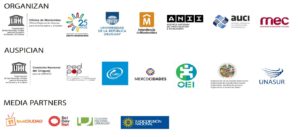Winner of the UNESCO Kalinga Prize for Popularization of Science (2015), Diego Golombek travels to the Uruguayan capital from September 7 to 9 to participate in the CILAC Forum 2016, I Open Science Forum – Latin America and the Caribbean.
Your participation in CILAC will begin with a “Scientific Coffee” open to the public, on the 7th, at the Montevideo Agricultural Market, at 5:00 p.m. Then, on September 8, at the facilities of the Technological Laboratory of Uruguay (LATU), main headquarters of CILAC 2016, Golombek will offer conferences, joining the panel in the morning Public policies of scientific culture: trajectories in the region and challenges in measuring impact. For the Argentine biologist “there is no doubt that the greatest impact that can be obtained lies in the implementation of new educational policies for all age and socioeconomic levels. This covers both formal education – where teacher training with new approaches and views on science teaching should not be forgotten – and non-formal education, with the use of new formats, including audiovisual, computer, and museum formats.”
In the afternoon, he will share with prominent national experts a discussion table on children and young people's approach to scientific knowledge. For the Argentine scientist: “It is clear that we are doing something wrong with scientific education in our countries, especially if we judge the results of international tests on the subject. At some point we stop taking advantage of the innate curiosity and method that we bring from the factory and we constrict them in a formal education that, beyond being able to teach scientific facts, usually leaves out scientific thinking.” For Golombek, CILAC 2016 will also be the opportunity to share the panel The responsibility of scientists in scientific dissemination with the Vice-President of the Brazilian Society for the Progress of Science, Ildeu de Castro Moreira, among other prominent scientists.
This prominent Argentine scientist is Principal Investigator of CONICET (National Council for Scientific and Technical Research), where he received the “Bernardo Houssay” national science award. He was also awarded the Konex award in communication and the “Ciudad Capital” award of the Federal District of Mexico.
For CILAC, the enormous challenges of our time, framed in the 2030 Development Agenda, require the interdisciplinary and multisectoral collaboration of all. The public involvement of actors like Golombek in the search and discovery of new knowledge is fundamental for sustainable development. Golombek makes science visible to all people. In symbiosis with the CILAC proposal, it connects, dialogues, debates, combines science with everyday life.
Be part, register HERE. Access is free and open.

